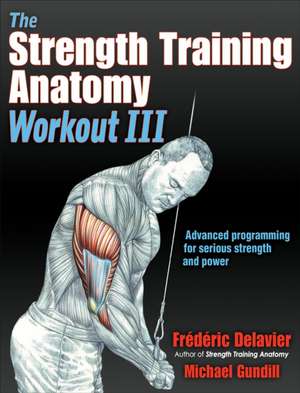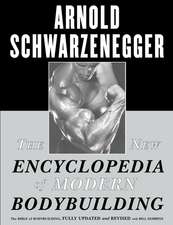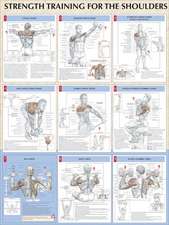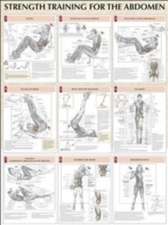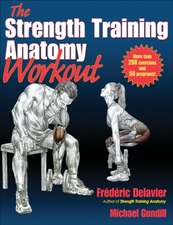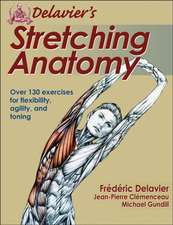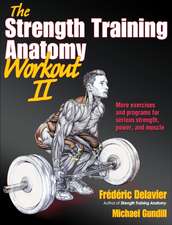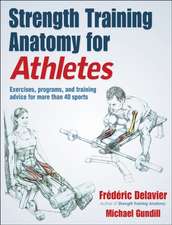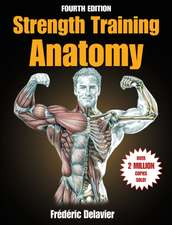The Strength Training Anatomy Workout III – Maximizing Results with Advanced Training Techniques: Anatomy
Autor Frederic Delavier, Michael Gundillen Limba Engleză Paperback – 16 mai 2019
Books by best-selling author Frederic Delavier have sold more than two million copies. His latest, The Strength Training Anatomy Workout III, is an advanced guide to the secrets of training. It will help you cross the plateau to achieve greater muscle development and gains.
Preț: 176.07 lei
Nou
Puncte Express: 264
Preț estimativ în valută:
33.70€ • 35.05$ • 27.82£
33.70€ • 35.05$ • 27.82£
Carte disponibilă
Livrare economică 22 martie-05 aprilie
Livrare express 11-15 martie pentru 71.69 lei
Preluare comenzi: 021 569.72.76
Specificații
ISBN-13: 9781492588511
ISBN-10: 1492588512
Pagini: 256
Ilustrații: 146 Illustrations
Dimensiuni: 198 x 256 x 16 mm
Greutate: 0.75 kg
Editura: MG – Human Kinetics
Seria Anatomy
ISBN-10: 1492588512
Pagini: 256
Ilustrații: 146 Illustrations
Dimensiuni: 198 x 256 x 16 mm
Greutate: 0.75 kg
Editura: MG – Human Kinetics
Seria Anatomy
Cuprins
Part I. Deepen Your Understanding of Advanced Anatomy and Morphology
Analyze Your Anatomy and Morphology
Can an Athlete Escape Wolff’s Law?
What Is the Proper Range of Motion for Maximum Gain Without Injury?
Part II. Training and Recovery Techniques
Advanced Training Techniques
Part III. Strength Training
Enlarge and Protect the Shoulders
Jammer Press
One-Arm Lateral Raise, Cheating, With a Dumbbell
Attack the Complex Muscles of the Back
Deadlift for the Latissimus Dorsi
Reverse Hyperextension
Delavier’s Shrug
Target the Chest
Floor Press
Build the Biceps, Triceps, and Forearms
Power Biceps Curl Using a Low Pulley
Power Triceps Extension Using a High Pulley
Strengthen the Core
Standing Power Crunch With a Resistance Band for Dynamic Core Work
Fill In the Quadriceps
Squat Using a Machine
Vertical Leg Press
Catch Up the Hamstrings
Hip Extension
Fill In the Adductors and the Sartorius
Sartorius Exercise
Understand and Manage Unequal Development in the Calves
Part IV. Advanced Programs
Advanced Warm-Up Programs
Analyze Your Anatomy and Morphology
- The Worst Squat in the World
- Anatomy and Morphology: Concepts That Are Often Misunderstood
- There Is No Miracle Exercise That Is Perfect for Everyone
- Are the Proportions of the Vitruvian Man Real?
- A Few Simple Rules
- Analysis of Arm Length
- Long and Short Torsos
- The Ratio Between the Abdomen and the Rib Cage
- Large Hips/Narrow Hips: How Does This Affect the Thighs?
- Short Thighs/Long Thighs
- The Paradox of Upper-Body/Lower-Body Development
- Genetic Secrets of the Calves
- Conclusion
- When Your Future Is Obvious From Your Morphology
- Success, Yes… but Not at Any Cost!
- Be Clever Like a Chess Player
- Start With a Total Body Warm-Up
- Specific Warm-Up for Weak Areas
- Complete Warm-Up for the Muscle Groups That You Plan to Work
- The Function of Relaxin
- Fatigue: Another Cause of Joint Hypermobility
- The Weather Report and Joint Pain
- How to Manage Temporary Joint Hypermobility or Sensitivity to the Weather
- What to Do If a Hypermobile Joint Does Not Get Better
Can an Athlete Escape Wolff’s Law?
What Is the Proper Range of Motion for Maximum Gain Without Injury?
- Partial or Full Repetitions?
- The Advantages of a Full Range of Motion/Disadvantages of a Partial Range of Motion
- The Disadvantages of a Full Range of Motion/Advantages of a Partial Range of Motion
- Conclusion
Part II. Training and Recovery Techniques
Advanced Training Techniques
- Target Muscles With Surgical Precision
- The Method of Contraction Influences the Muscle Area That Is Recruited
- Strategies for Adjusting Rest Breaks Between Sets
- Practical Applications of the Jendrassik Maneuver
- Changing the Center of Gravity by Adding Weight
- The Give-and-Take Theory for Progress
- Electrical Muscle Stimulation
- What Is the Point of Blood Flow–Restricted Training?
- Vibration and Oscillation Techniques
- A Better Definition of the Concept of Overtraining
- Heterogeneous Recovery Times
- Double Shock
- Nervous System Damage Following a Workout
- How Can You Promote Nerve Recovery?
- Understanding Aches and Pains Better
- Ensure Tendon and Joint Recovery
- Master Recovery Through Targeted Supplementation
Part III. Strength Training
Enlarge and Protect the Shoulders
- Specific Shoulder Pathologies
- Problems Developing the Shoulders
Jammer Press
One-Arm Lateral Raise, Cheating, With a Dumbbell
Attack the Complex Muscles of the Back
- Anatomy and Morphology Characteristics
- Pathology Specifics
- Problems Developing the Back
Deadlift for the Latissimus Dorsi
Reverse Hyperextension
Delavier’s Shrug
Target the Chest
- Why Is the Development of Chest So Unbalanced?
- Anatomy Specifics
- Specific Information About Good Training Materials
Floor Press
Build the Biceps, Triceps, and Forearms
- Problems Developing the Biceps
- Problems Developing the Triceps
Power Biceps Curl Using a Low Pulley
Power Triceps Extension Using a High Pulley
Strengthen the Core
- Problems With Core Strength
- Problems Trimming Fat
- Problems With Water Retention in the Abs
- Problems With a Muscle That Lacks Endurance
Standing Power Crunch With a Resistance Band for Dynamic Core Work
Fill In the Quadriceps
- Biomechanical Specifics
- Specifics About Proper Training Materials
- Morphological Characteristics
- Problems Developing the Quadriceps
Squat Using a Machine
Vertical Leg Press
Catch Up the Hamstrings
- Anatomy and Morphology of the Hamstrings
- Problems Developing the Hamstrings
- Problems With Regional Recruitment of the Hamstrings
Hip Extension
Fill In the Adductors and the Sartorius
- Anatomy and Morphology of the Adductors
- The Sartorius Is an Indispensable Muscle for Competitions
Sartorius Exercise
Understand and Manage Unequal Development in the Calves
- Physiological Characteristics
Part IV. Advanced Programs
Advanced Warm-Up Programs
- Basic Warm-Up
- Complete Warm-Up
- Catch Up the Arms
- Catch Up the Upper Chest
- Catch Up the Back of the Shoulders
- Catch Up the Back
- Catch Up the Thighs
Notă biografică
Frédéric Delavier is a gifted artist with an exceptional knowledge of human anatomy. He studied morphology and anatomy for five years at the prestigious École des Beaux-Arts in Paris and studied dissection for three years at the Paris Faculté de Médecine.
The former editor in chief of the French magazine PowerMag, Delavier wrote for several fitness publications, including the French magazine Le Monde du Muscle, Men's Health Germany, and Ironman. He is the author of the best-selling Strength Training Anatomy, Women’s Strength Training Anatomy, The Strength Training Anatomy Workout, The Strength Training Anatomy Workout II, Delavier's Core Training Anatomy, Delavier's Stretching Anatomy, and Delavier’s Women’s Strength Training Anatomy Workouts.
Delavier won the French powerlifting title in 1988 and gives worldwide presentations on the sport applications of biomechanics. His teaching efforts have earned him the Prix de Techniques et de Pédagogie Sportive. Delavier lives in Paris, France.
Michael Gundill has written 16 books on strength training, sport nutrition, and health, including coauthoring The Strength Training Anatomy Workout, The Strength Training Anatomy Workout II, and Delavier’s Women’s Strength Training Anatomy Workout. His books have been translated into multiple languages, and he has written over 500 articles for bodybuilding and fitness magazines worldwide, including Iron Man and Dirty Dieting. In 1998 he won the Article of the Year Award at the Fourth Academy of Bodybuilding Fitness & Sports Awards in California.
Gundill started weightlifting in 1983 in order to improve his rowing performance. Most of his training years were spent completing specific lifting programs in his home. As he gained muscle and refined his program, he began to learn more about physiology, anatomy, and biomechanics and started studying those subjects in medical journals. Since 1995 he has been writing about his discoveries in various bodybuilding and fitness magazines worldwide.
The former editor in chief of the French magazine PowerMag, Delavier wrote for several fitness publications, including the French magazine Le Monde du Muscle, Men's Health Germany, and Ironman. He is the author of the best-selling Strength Training Anatomy, Women’s Strength Training Anatomy, The Strength Training Anatomy Workout, The Strength Training Anatomy Workout II, Delavier's Core Training Anatomy, Delavier's Stretching Anatomy, and Delavier’s Women’s Strength Training Anatomy Workouts.
Delavier won the French powerlifting title in 1988 and gives worldwide presentations on the sport applications of biomechanics. His teaching efforts have earned him the Prix de Techniques et de Pédagogie Sportive. Delavier lives in Paris, France.
Michael Gundill has written 16 books on strength training, sport nutrition, and health, including coauthoring The Strength Training Anatomy Workout, The Strength Training Anatomy Workout II, and Delavier’s Women’s Strength Training Anatomy Workout. His books have been translated into multiple languages, and he has written over 500 articles for bodybuilding and fitness magazines worldwide, including Iron Man and Dirty Dieting. In 1998 he won the Article of the Year Award at the Fourth Academy of Bodybuilding Fitness & Sports Awards in California.
Gundill started weightlifting in 1983 in order to improve his rowing performance. Most of his training years were spent completing specific lifting programs in his home. As he gained muscle and refined his program, he began to learn more about physiology, anatomy, and biomechanics and started studying those subjects in medical journals. Since 1995 he has been writing about his discoveries in various bodybuilding and fitness magazines worldwide.
